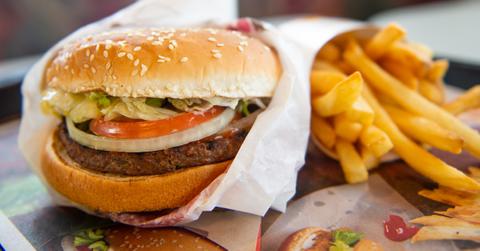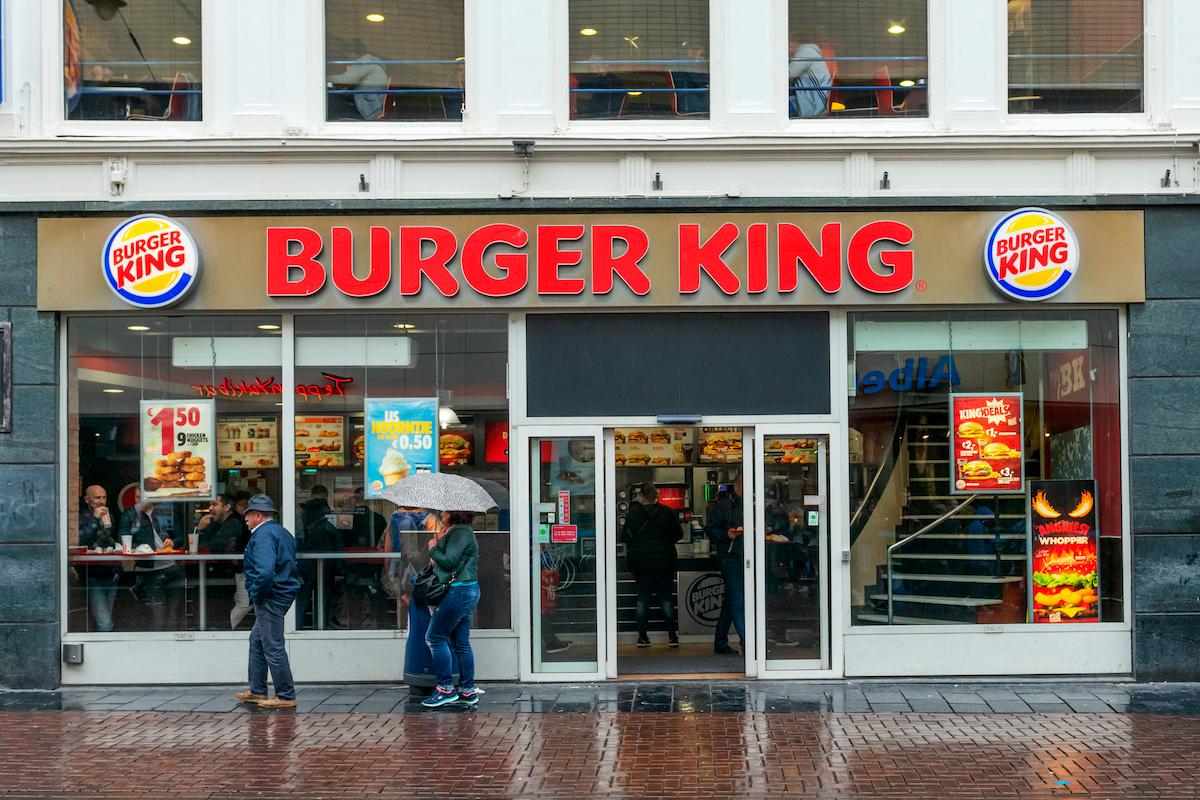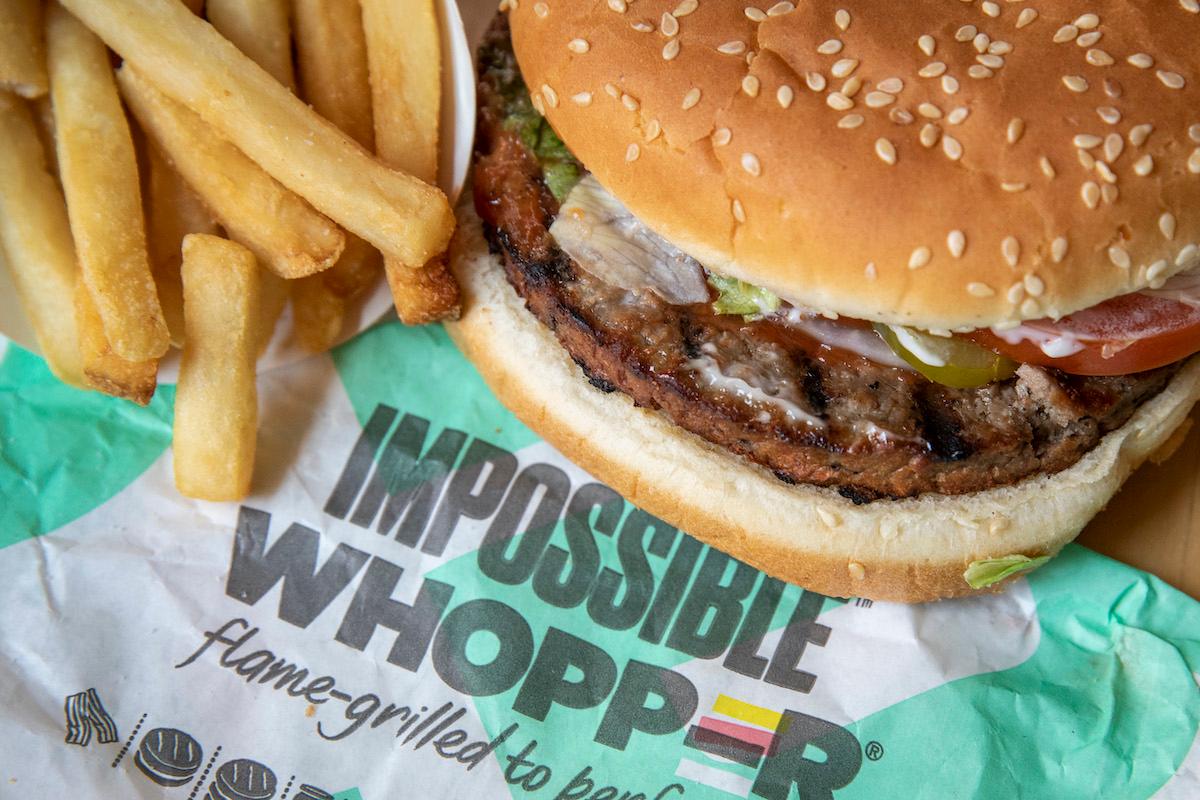Does Lemongrass Reduce Cows' Methane Emissions?
Burger King is testing adding lemongrass to cattle feed to lower methane emissions — but is that sufficient?
Updated July 14 2020, 2:58 p.m. ET

An Impossible Whopper, made with plant-based patties from Impossible Foods, sits on a table at a Burger King restaurant.
In a new sustainability report (and accompanying country music video starring the Walmart yodeling kid), Burger King claims that by adding lemongrass to cow feed, emissions can go down by an average of 33 percent. But with so many issues running through the beef and dairy industries, customers may be wondering: Does lemongrass really reduce cows’ methane emissions? And if it does, is that small change really enough to make a dent in alleviating the climate crisis?
Burger King is adding lemongrass to cattle feed.
On Tuesday, July 14, Burger King's parent company Restaurant Brands International (which also owns Popeyes and Tim Hortons) shared a sustainability report that Burger King commissioned detailing the company's response to this problem. In the report, the fast food chain notes the FAO statistic that livestock is responsible for an estimated 14.5 percent of all human-induced greenhouse gas (GHG) emissions; of those emissions, beef production accounts for 41 percent, and dairy production accounts for 20 percent.
So in an attempt to address this issue (or perhaps just to make consumers think BK is addressing this issue), Burger King decided to look at the methane emissions in the cattle industry, since ruminant cows get such a bad rap for emitting the potent greenhouse gas methane, which contributes to the greenhouse effect and global heating.
After conducting research on methane and cows, the BK team is now experimenting with adding 100 grams of lemongrass per cow to the cows’ feed each day in select locations. (Most of the cows who Burger King slaughters consume feed that consists of 68 percent corn.)
Does lemongrass really reduce cows’ methane emissions?

The study — which the BK team commissioned themselves — suggests that methane emissions from cows’ digestive process went down by up to an average of 33 percent per day while they were fed lemongrass. 33 percent sounds like a pretty significant statistic — however, there are a lot of other details worth noting about this project.
For one thing, the cows are only being fed lemongrass during the last 3 to 4 months of their lives, before being sent to the slaughterhouse — before that point, the farmers are responsible for their cows producing the same amount of methane and emissions as any other factory-farmed cow.
(For context, in the beef industry, cows are typically killed at around 18 months of age; in the dairy industry, once mother cows can no longer get pregnant and their milk supply goes down, they are typically killed for low-grade beef at around 5 years of age. In the wild or sanctuaries, cows can live for more than 20 years.)
Additionally, Burger King is only serving burgers made from cows consuming this lemongrass-spiked feed at five select BK restaurants in Miami, New York City, Austin, Los Angeles, and Portland, Ore.
"Reducing cows' methane emissions during less than a quarter of their lives is a drop in the bucket compared to the 2,500 gallons of water it takes to make 1 pound of beef, the 40 percent of land taken up by animal agriculture, and the 500 million tons of manure that the meat industry produces each year," PETA Executive Vice President Tracy Reiman exclusively tells Green Matters in an email. "Don't be fooled by corporate greenwashing: If Burger King truly wants to do its part to stop climate change, it would dump the meat in favor of vegan options, some of which it already sells."
So while feeding lemongrass to this small sample of cows for a few months may marginally reduce the amount of methane in the atmosphere, there are numerous other factors to consider when looking at the impact of the beef industry.
Why is beef bad for the environment?
When analyzing the beef industry, it would be irresponsible to ignore the issues besides methane that accompany it — for example, the industry comes with major concerns, such as animal welfare, air pollution, water pollution, and risks to slaughterhouse workers. There are also serious public health risks: factory farms and slaughterhouses can make their local communities sick (which are often Black communities, Brown communities, and low-income communities), and eating meat (especially heavily-processed meat from a fast food restaurant) presents many health issues to the consumer.
Not to mention, cattle ranching accounts for 80 percent of deforestation in the Amazon rainforest, according to Yale. Cattle ranchers are known for purposely setting large areas of the rainforest on fire to clear-cut trees and make room for cattle farms, and this practice was a major cause of 2019’s devastating Amazon rainforest fires, which are on course to repeat again this year.
This is the best way to reduce the impact of eating beef and dairy.
Consumers are growing increasingly concerned with the impacts of the beef industry — and Burger King’s lemongrass-infused response to the issue today is likely going to convince many consumers that Burger King is a reputable place to purchase beef from. However, if you want to stop supporting the beef and dairy industries and lower your environmental impact, the best way to do that is to stop buying these foods altogether.
According to a comprehensive 2018 study out of the University of Oxford, eating a vegan diet is the most effective way to lower one’s environmental impact. And fortunately for Whopper fans, it’s easy to eat plant-based at Burger King.
Burger King’s Impossible Whopper is much better for the environment than beef — regardless of diet.

Last year, Burger King unveiled the Impossible Whopper — a burger nearly identical to the standard Whopper, but made with a plant-based Impossible Foods patty that tastes incredibly similar to beef. The burger is available at BK restaurants nationwide, and as long as you order with no mayo, the entire meal will be vegan.
And earlier this summer, Burger King rolled out the Impossible Croissan’wich, a breakfast sandwich featuring a vegan Impossible sausage patty. Unfortunately, the sausage patty is the only animal-free part of the sandwich, as it also contains dairy cheese, chicken eggs, and a non-vegan croissant, according to VegNews.
Details aside, these menu items make it clear that Burger King’s customers are ready for more planet-friendly, animal-free options to grace the menu. Instead of Burger King giving customers more reasons to order beef from them (which today’s report and music video aim to do), it would be more impactful if BK started introducing other vegan options, doing more advertising and education surrounding the Impossible Whopper, and offering incentives (such as lower prices) to customers for ordering vegan meals. There’s no right way to do the wrong thing, and Burger King could make history if its leadership team genuinely started prioritizing the planet above profit.